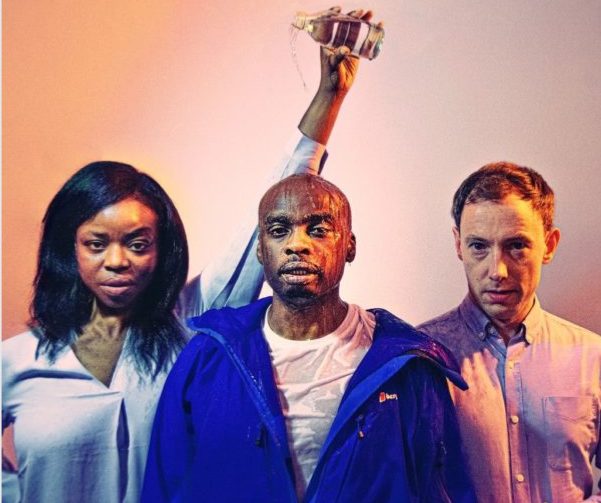Serge is seeking asylum. He appeals to two nameless officials, A and B. He strikes up an easy camaraderie with eager to please, self-effacing A. B is harder to impress, certain she’s abiding by the rules, certain Serge is there to catch them out.
This is a brilliantly acerbic script from Tim Cowbury. Built on the notion that we see what we want to see, it kicks off by reminding us all that we’re in a space (Paines Plough‘s gorgeous Roundabout) built around make-believe and created for the sharing of stories. It quickly becomes clear that A and B have created narratives of their own to give themselves something to look forward to as they slog through the repetitive drudgery of their day.
Serge hails from the Democratic Republic of Congo, so both officials heap a pile of expectations onto him, riding rough shod over anything he actually says. Throw into the mix the fact that Serge doesn’t speak much English so A is translating a version of Serge’s narrative for B’s benefit and you have a whole heap of trouble.
At one level, a scathing indictment of the asylum process, at another, this is a play about power. The power afforded by gender, by status, by skin colour. The atrocious assumptions we make about those that wander into our stories and the extent to which we rewrite our own stories to suit.
Weighty subject matter to one side, Mark Maughan‘s production is also very funny in that cheekily audacious, can’t believe anyone would actually say that, way. The humour’s helped along by three polished performances.
Nick Blakeley (A) wants you to like him so much that you can’t quite – but ultimately, he likes the sound of his own voice more. Emmanuella Cole (B) is so ensnared in the system that she can’t envisage a life outside it. And Ery Nzaramba (Serge) is a regular, likeable guy, trying his best to get on with his regular, likeable life in Streatham. Enormously endearing, his treatment at the hands of the blank officials becomes all the more shocking.
The Claim shines a light on the stories we tell ourselves and more importantly, the stories that remain untold because we choose not to listen.
